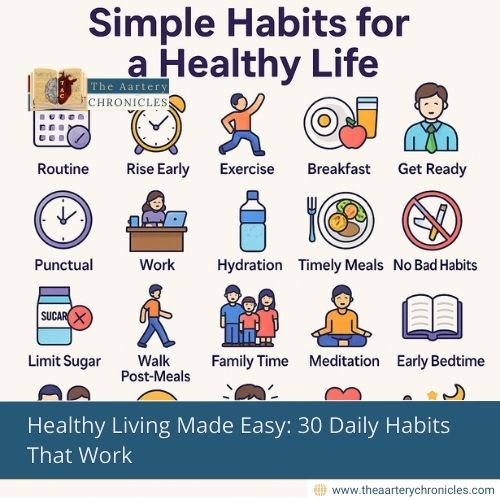

Healthy Living Made Easy: 30 Daily Habits That Work
Our health depends on us, our choices, and our habits. It is up to us to decide whether we want to live hale, hearty, and healthy or tired, stressed, and ill. As you know, our body is like a machine that repairs and regulates all the cells, nerves, tissues, etc. Just being born a human is not enough; it is the way you care for your body that matters. A healthy body and a sound mind make us happier and calmer.
Let us see some of the everyday habits we can inculcate in ourselves. Mind you, discipline and consistency are of prime importance here.
Habits to follow
- Routine: To begin with, make a routine. to be followed each day. List out your activities and tasks by priority, and try to follow them as best as you can. Given the work culture nowadays, this may prove a tad difficult, but the effort you make is commendable.
- Rise early: Try to wake early, as this is the best time for reflection and “me-time”. The first thing you do is make your bed immediately as you wake up. Then, express gratitude for all that you have. The beautiful sunrise, the eyes to see it with, the chirping of the birds, the ears to hear it with and so on. Waking up early in the morning has a calming effect on us.
- Exercise: Practice Yoga, deep breathing techniques, meditation, aerobics, Zumba, gymming, walking, jogging, running, or any sort of physical movement to get your body moving. If you are not a fan of heavy-duty exercises, just do the simple ones like you learnt in school during PT class.
- Breakfast: Enjoy your breakfast mindfully. Try not to check your mobile/laptop till breakfast is done. Have fresh and seasonal fruits as part of breakfast.
- Get ready: Get ready for work with care and effort, looking your best. Leave so you can get there early. Often, we tend to rush breakfast and scoot so as to arrive on time. In a hurry, we often do not get time to dress carefully.
- Punctual: Arriving on time or before time is good. At least there is no stress that we are running late. We reach our destination calm, relaxed and enthusiastic to take on the challenges.
- Work: At work, try to take a break of a few minutes, every hour of sitting, to walk around the office, do some stretching, practice some neck movements/eye movements or leg movements to regulate the muscles. Prolonged sitting in one place can cause stiffness of the neck, legs, and back, poor posture, tired fingers/eyes, or swollen legs.
- Hydration: Hydration is essential for our body, as we all know. Keep sipping water at regular intervals, so as to avoid dehydration. Be it at home or work, or travelling or elsewhere, remember to stay hydrated. If you don’t like drinking regular water all the time, try infused water – cucumber, lime, orange, sabja (sweet Basil) seeds, fennel seeds, cumin seeds.
- Timely meals: Try to eat timely meals as much as possible – lunch: not later than 2 pm, and dinner- not later than 8 pm. Early meals smooth the digestion, and we sleep better. Take a balanced meal with essential nutrients that nourish and are good for our bodies.
- No bad habits: Avoid alcohol, tobacco, and substance use. They may seem interesting and trendy now, but they are harmful to your health. Avoid too much reliance on gadgets and limit screen time.
- Limit sugar: Limit your sugar intake. If you stop consuming sugar and sugary products, all the better. Avoid sweetened juices, sugar-free drinks, ice cream, fizzy colas, and syrups, as they are not going to help your body at all. Some sugar-free eatables and beverages contain more sugar additives than actual sugar.
- Walk post-meals: Walk for 10-15 minutes immediately after eating, as this helps in digestion. You can also sit in Vajrasana for 5 minutes post-meals.
- Dinner: Have your dinner 2-3 hours before bedtime, so it can be digested before bedtime.
- Recreation: Practice digital detox daily, if possible. Ignore your digital devices after dinner. Invest time in your hobbies, sign up for a new course, visit the library, visit the park, read, draw, paint, sing, dance, learn a new language, or do any activity that interests you or piques your curiosity. Practice journaling or doodling or mandala, or zentangle to calm yourself and relax. Play board games like chess, ludo, or play carrom board or sports like table tennis, badminton, roller skating, cricket, football, etc.
- Family time: Talk with your family, discuss your problems with your parents, speak your heart out to your partner, talk about the children’s school and how they are faring, discuss school projects, plan get-togethers, plan holidays, laugh together… anything.
- Meditation: Practice some meditation daily. This will calm your mind and relax you. It is simple: all you need to do is sit comfortably, close your eyes and focus on your breathing. Alternatively, there is walking meditation – where you walk mindfully, conscious of every moment- feeling it with your senses: the hard texture of the floor, the softness of the grass, the cool breeze fanning you, the sounds around you, the birds, traffic, people speaking, and marvel at the beauty of nature. Mindful walking will enhance your awareness of the present moment and overpower all your thoughts, worries and stress.
- Motivation: You can experience motivation by reading books by motivators, listening to TED Talks, motivational speeches, and being in the company of people who motivate and encourage you.
- Good company: Surround yourself with people who are positive and who want the best for you. Those who make you happy and smile. This brings about positivity in your attitude, also.
- Laugh: Laugh a bit more. Laughter is the best medicine, so they say. It does not cost anything and releases any tension from your body and mind. It is infectious, and one infection that we would love to have 😊
- Manage stress: Try to manage your stress. Worrying is not going to solve the issue; rather, you are spoiling your “today’, worrying about the “tomorrow” that is yet to come. Prioritise peace of mind instead.
- Love and care: Demonstrate your love and care for your loved ones a bit more. Don’t put off family get-togethers or family time together. Appreciate your family and loved ones and express your gratitude and love to them. If you love someone, just say it now, for tomorrow may be too late.
- No comparison: Avoid comparing yourself with others. All you need to know is that you are the best and you are doing your best. That is what matters. Comparisons will lead to envy and negativity, which we need to avoid at all costs.
- 23. Virtues: Develop your virtues, be humble, be kind, be supportive, be co-operative, be patient, be resilient, be brave, be strong, be just, be respectful. Work hard to achieve your goals, but not by any underhanded means.
- Self-love: Indulge in self-care and self–love. If you love yourself, then it is easy to love others. Respect yourself so you can respect others. Learn to “say no” and value yourself. You are not a doormat; speak up for yourself, and stand up for yourself.
- Early bedtime: We need to follow an early bedtime, so we wake refreshed and energetic the next morning. Prioritising a good night’ sleep is essential.
- Consistency: Being consistent is what helps. Some habits are difficult to let go of, but as my Yoga teacher says, “replace the bad habit with a new good habit” and gradually you will become a better person. For example, if you shirk exercising every day, then ask a friend to join you. This way, your shirking will turn to consistency. For the scrooges, join up for paid sessions – that way you will not miss even a day (as you paid for it).
- Volunteer: Volunteering is a good way to be empathic. It makes you feel supportive and confident.
- Misconceptions: Try not to judge others, for you never know what that person has experienced or is experiencing in their life. Judging gives rise to misconceptions, which in turn hampers relationships.
- Acceptance: Accept your flaws and mistakes and acknowledge them. Do not be ashamed, after all, it is human to err. Accept if someone has wronged you and forgive them. Accept that all days will not be alike; there will be some pluses and minuses, take it all in your stride. Accept that there will be sunny days and there will be dark days. Days when you feel on top of the world and days when you feel down in the “dumps”. Be scared, be disillusioned, be sad, be angry, don’t hide your feelings. Accept what you feel.
- Prayer: Prayer is thanking God for all that he has given us. A few minutes of prayer may help you find solutions to your problems; it is a means of expressing gratitude and finding peace.
These are some basic habits that we need to practice for improved physical, mental, emotional and spiritual health. Good health is made up of all these elements. Once we have all these covered, we are sorted! All negativity will be wiped off from our lives, and we will become better human beings. We will be at our best and do our best at all times. We will overcome fear of failure, fear of judgement, fear of ridicule, fear of “what will people say”. We will be confident, assertive, calm, composed, healthier, stronger, happier. Good health will lower the onset of lifestyle-related chronic ailments.
So, what do you want to be? Someone who keeps rushing through the days with no time to eat or sleep, or someone who works as well as takes out time for the family and for themselves, too.
Life is simple, just that we tend to complicate it. So let us simplify our lives and keep doing our best. It is alright to slow down or feel bogged down at times, as failure is also a part of life. We learn and we grow – this is an ongoing process.
Live and learn!









